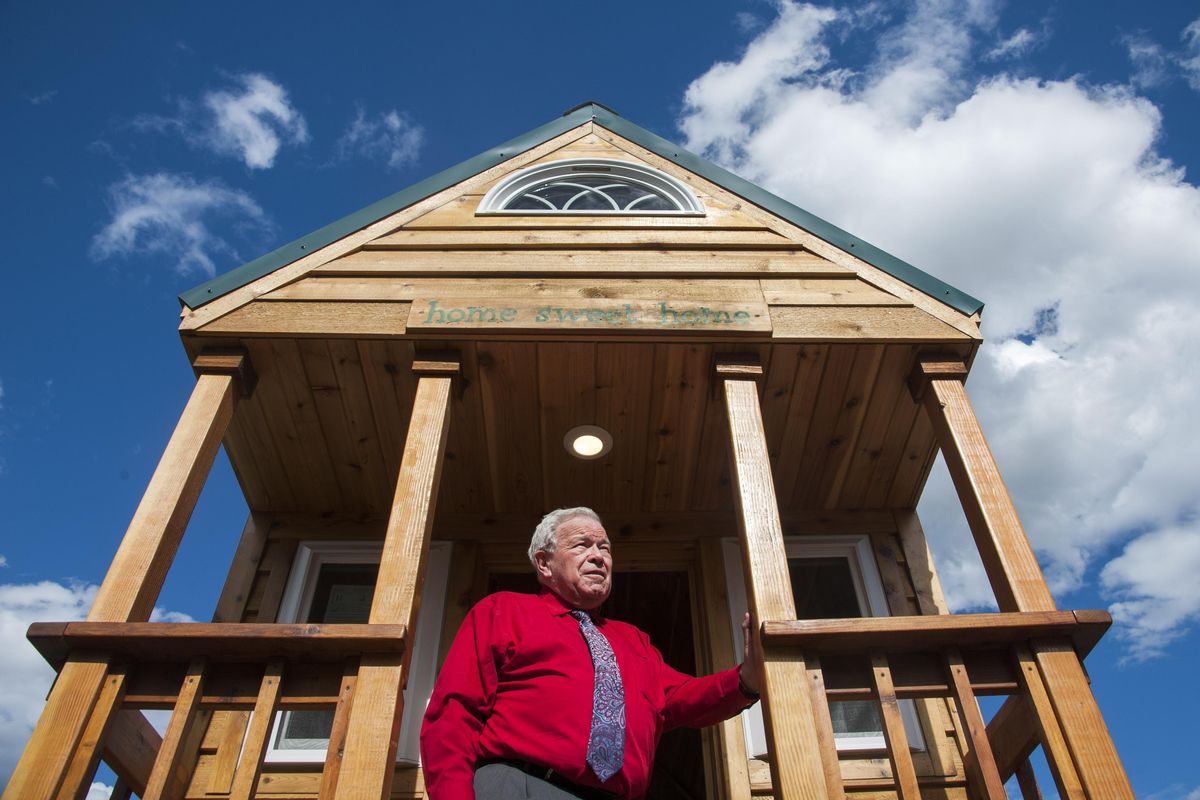Group wants to build tiny homes for homeless families on Spokane Valley church land

Where most people see a fallow field just south of Interstate 90, Ian Robertson sees the beginning of a village of tiny homes.
Robertson is the president of the Inland Northwest Fuller Center for Housing, a faith-based nonprofit organization that works to end homelessness in the greater Spokane-area.
Last week, Robertson held a small groundbreaking ceremony on the property that belongs to Living Hope Community Church, on East Broadway Avenue, just a few blocks from Sullivan Road.
“The homeless families who move in here will own their own homes,” Robertson said. “It’s like a lease-to-own setup. They pay for the unit in five to seven years.”
The tiny homes look like small, two-story, wooden cabins on wheels. Built on a standard trailer bed, a tiny home can house up to four people, and it has a kitchen, bathroom and air conditioning.
Robertson said a unit will cost about $20,000 and a family should expect a lease payment of around $325 a month.
Tiny home villages for homeless is nothing new, but Robertson said the Spokane Valley project is different from other projects in the Northwest.
“What they have in Seattle is just a mess,” Robertson said, “And we use our own money.”
However, Robertson needs $700,000 to make the project a reality, and to accomplish that, he’s looking for investors and donors who will commit to the project with monthly or one-time donations.
Robertson said state Sen. Mike Padden has promised to help secure funding from the state.
The Spokane Valley Republican said he doesn’t have any specific funding sources in mind.
“It’s a very worthwhile project, and Ian is so enthusiastic,” Padden said. “He has a lot of community support. So far, I don’t think there is any government money in it at all.”
Padden said the election this fall makes it difficult to predict what funding may become available.
“We will definitely look at it and try to see what we can do,” Padden said.
The land owned by Living Hope Community Church is not zoned to allow for tiny homes, but that does not deter Robertson, who said he’s got great support from the Spokane Valley City Council when it comes to changing the zoning.
Micki Harnois, a planner with Spokane Valley, said tiny homes on axles and a chassis are considered RVs.
“We don’t allow RVs on residential property for more than 30 days,” Harnois said.
Taking the wheels off the units doesn’t change much, as current zoning doesn’t allow for any other dwelling on church property than a parsonage, Harnois said. “Without wheels they become dwellings, and then building codes apply,” Harnois said.
But that doesn’t mean a tiny home village is impossible in the future.
The city is reviewing its comprehensive plan, and Harnois said that includes looking at all its housing and zoning policies, including those for tiny homes.
“We have nothing in our codes or regulations to address these tiny homes right now,” Harnois said. “But maybe it’s possible to change the zoning for church land. Maybe we can find something that works in their favor.”
Spokane Valley Councilman Ed Pace said Robertson’s tiny home village has broad support on the City Council. Pace said he and Mayor Rod Higgins have been meeting with the affordable housing community.
“We are hoping to see more projects like this one,” Pace said. “If the land is not zoned correctly, we are going to do everything we can to change the zoning if we have to.”
“We want to make sure that we are zoned properly for doing tiny homes in the future,” Pace said, “both on church grounds and, if a developer wants to do so, on private land.”